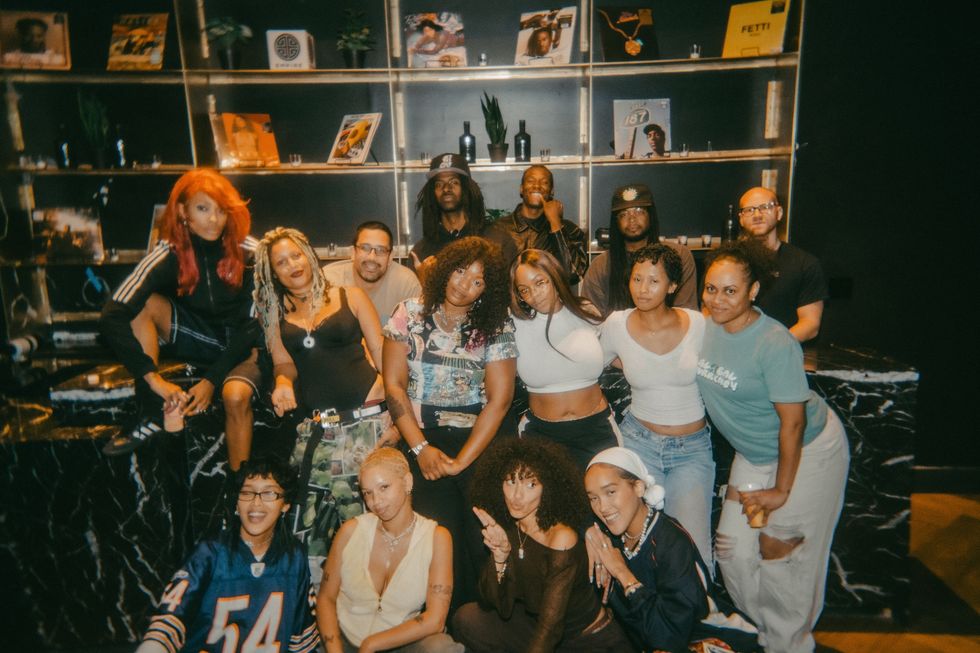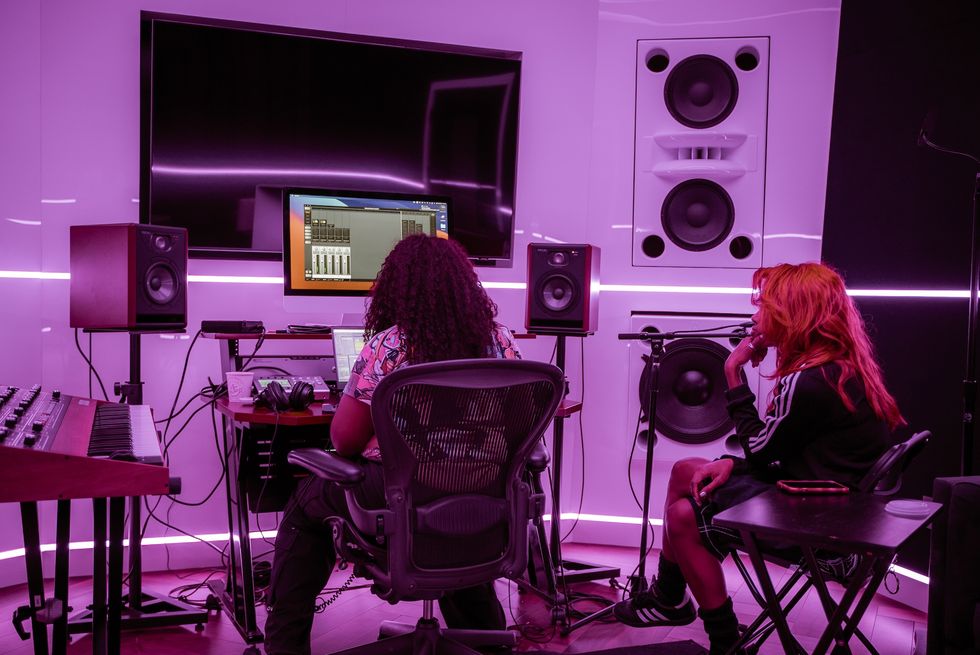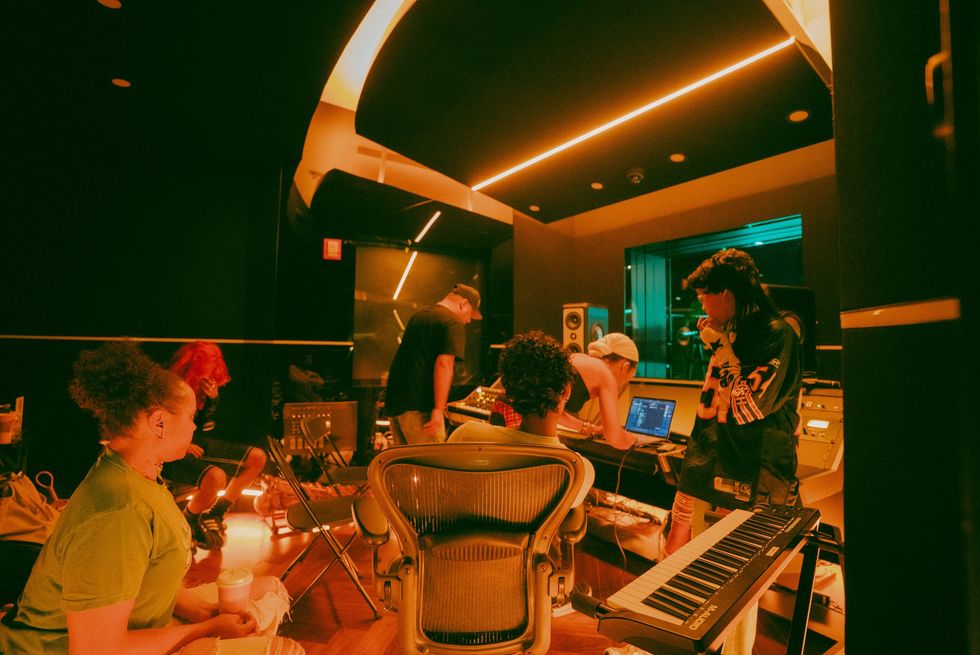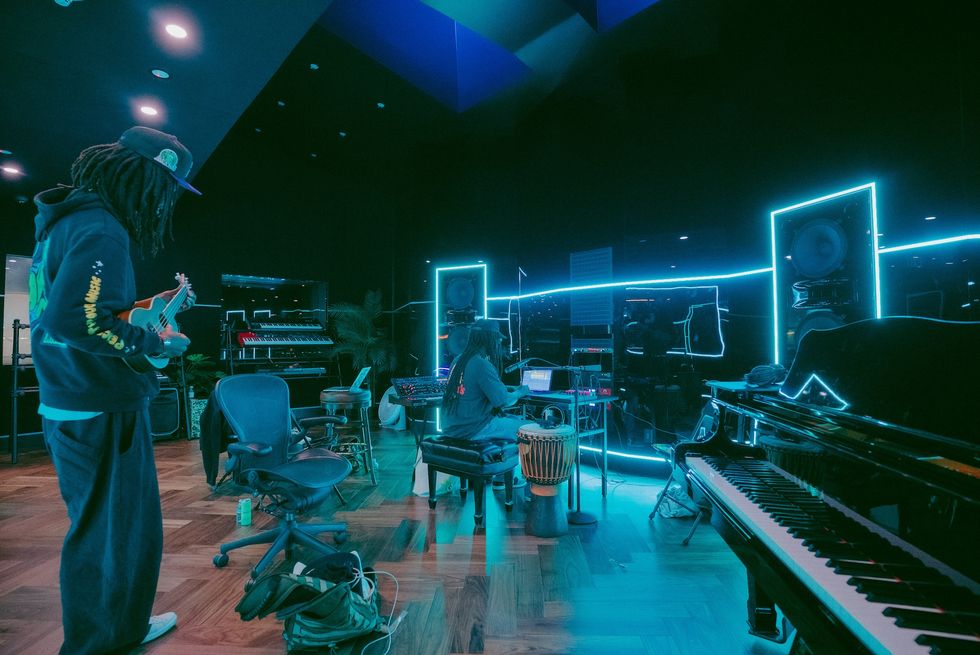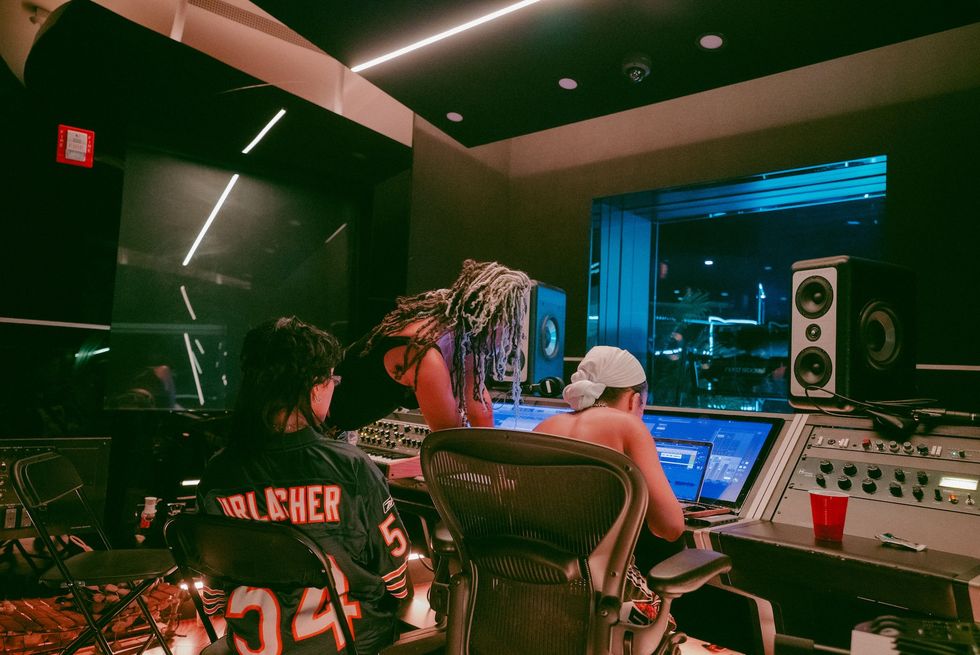
Aluna's Vision: Building a Thriving Black Dance Community
By Joan Summers
Sep 06, 2024Aluna is building something unlike anything I’ve ever seen before — in the club and in the studio and out in the world — amongst her people.
I’m onstage at 1015 Folsom in San Francisco, watching her play with the crowd and her dancers. She bounces back and forth from the decks to perform her new material and spin older tracks, like “White Noise,” which the whole club goes up to. Alumni of the first ever Noir Fever writing camp, the reason I’m in my hometown at all, cluster around Aluna and the dancers, the joy of the experience written across their faces. I struggle to maintain my own composure, making note that it is, without question, the most fun I’ve had at a party all summer.
Moments prior, I’d huddled in the green room with Aluna for a conversation about her record label Noir Fever’s writing camp collaboration with record label EMPIRE. The journey towards this moment is grounded, in large part, by an open letter to the electronic music industry she wrote in 2020. In it, Aluna boldly declared: “Dance music was protest music, liberation from oppression, so it’s bitterly ironic for it to be appropriated by the white community, both burying its rich history and casting out the wider Black artists from a genre their community invented.” From there, she organized the Noir Fever festival in New Orleans in 2022, amid her own burgeoning solo career. Another album — 2023’s astounding MYCELiUM — and the label soon followed, formalized in partnership with EMPIRE. From there, the two teams worked to bring together Black artists from across the electronic music space for a week-long retreat at EMPIRE’s San Francisco campus, nestled between the Mission and the Design District, near SoMa.
Participants included icons like Uniiqu3, baby.com, RaeCola, Farrah Fawx, AQUTIE, Roofeeo, Brandon Banks, Paulina Singer, RM47, Hangaelle and Minzi Roberta.
Over the week, I bounced between studios with the artists in various stages of production and writing. Aluna envisioned them working on drafts and rough beats over the five days, expected for label-arranged camps like this. What happened next, however, shocked both Aluna and EMPIRE: participants came to the “show and tell” at the end of the week with nearly finished songs. I ask Aluna about her impression of the work: “I couldn’t be certain, but I can hear talent, and I can hear and see, ambition. I know the effect that Black women have on each other, but they don’t know that necessarily within this context.” In the day leading up to it, I noted how, when showing me their song cuts, baby.com, Farrah Fawx and the twin duo RaeCola were practically buzzing. Each expressed to me, during and between cuts, that they’d found community amongst each other, creative energies amplified as a result.
The songs, which I’m eager to hear mastered, speak for themselves.
As Aluna tells me later, the fruits of the camp were her ultimate dream, even if she was unsure going into the first iteration of the camp: “I thought the most fun was that I was going to be a facilitator and an observer, but then it happened to me as well.” Rather than just hover over the process, Aluna found herself finishing a song alongside the participants. “I was like, oops! It worked! I don’t know if it’s a formula, but it works," she says.
Back onstage, I lose myself momentarily in the swarm of people around me, baby.com and RaeCola hovering around Fawx and Paulina Singer after the two performed their new work onstage for the first time. Aluna, back at EMPIRE and in the green room, had stressed how important it was that participants of the camp feel fully embraced by the experience, and the community around Noir Fever. I break my reverie for a moment to jot down in my notes that in some impossible way, Aluna has carved out a momentary dream with her “girls” as she affectionately referred to them earlier. Electronic music, the club itself, exists on some parallel plane that connects us to each other, makes us equal. The crowd and the DJ and the dancers all work together to stop time for just a moment and forge that connection. Here in the real world, attempts to reach that other place succeed and fail to varying degrees, but I think back to my delight at seeing Aluna on the floor for baby.com’s set.
Where it goes from here remains to be seen, as Aluna admits herself. But the dream persists, as does her mission with Noir Fever, and her own music. “I know every Black woman in dance music, or nonbinary person, is going to experience a certain form of isolation that I am familiar with. I know that being comfortable, safe and welcome is something that other people walk through life having, and it does wonders for them. It really does. If you just give that to Black women, nonbinary people, you have no idea the explosion of creativity and skill and learning that a person will go through.” It ties back to her philosophy about the structure of the camp itself. “All of that energy is usually put into trying to act comfortable, trying to pretend that you’re safe when you’re not, and having a thick skin. That all takes energy and purpose away from what your gifts are."
To mark the occasion, listen to AQUTIE and Aluna's new single "Ghostin" above. Below, check out PAPER's full conversation with Aluna.
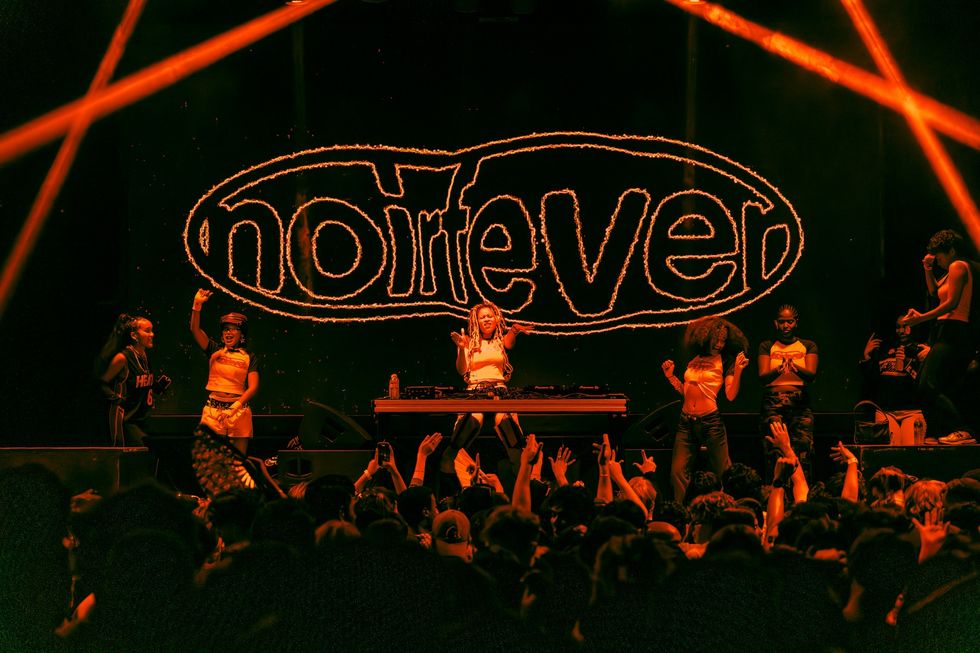
How are you feeling right now, moments before your set?
Weirdly? Relaxed.
After a busy week, that’s an interesting vibe, to be super relaxed.
Yeah, right? That is the effect of being with your people. It’s very strange, normally before shows, my heart is pumping, and I’m worrying about who’s playing before me, and after me. I often get an out of body experience.
The people that are here to perform are people that you’ve curated, people you brought to this camp for a specific purpose. Has it been interesting to see the fruition of that tonight with baby.com, who we just watched downstairs?
Absolutely. When I started this journey of Noir Fever, there was just this sense of wanting to have a place myself, and how vastly far away that would be, and the journey to get there felt impossible. It felt like I was putting criteria on an industry that just wasn’t built for me. So why am I even trying to find ways in it? Then I decided to work small, like one foot in front of the other, and build one person at a time, one thing at a time, and then it accumulated slowly. Over the course of four years, with this camp now, we’ve been looking for these individual people for years. It felt really easy, by the end, but only because of this whole history of what people went through.
Now that your first camp is under your belt, and you are going on a year out from launching the label, are you feeling excited for the next step?
I’m feeling like I had no idea that I could get something for me out of this industry, outside of money and bonds. I feel like I’m somebody who has grown up as an outsider, so I never really felt like I had a place, and my dream when I was making music early on was to feel like I could belong somewhere. When that kind of quickly disappeared, because I was suddenly in an even more extremely white situation, especially with the genres that I was working with, I put that out of my mind. Now, when I’m standing in a room full of my people, and I know I’m playing later, it just feels like we’re at a house party. And the funny thing is, like, everyone’s bringing serious A game. But it just feels fun, there’s no competition. I mean, it’s weird, people like to pit women against each other all the time, especially black women, and it’s funny because that’s not in our nature. People are trying really, really hard to do that.
I feel like it’s not just labels and the press, but sometimes fans and the internet, sending people things like: Did you see what someone said about you? Did you see her shady comment? Everyone wants to wind you up.
Right? I used to study white men, the way that they support each other, the way that they share knowledge, resources. They teach other other, all the DJs that I know, they tought each other, they shared their decks, they enjoy making these deals with each other and rolling deep. There was this sense that women don’t do that, that we “can’t stop bitching about each other, and arguing.” I was like, I’m just going to ignore all of that and just go straight for what everyone thinks is even worth anything, and to discover how much it’s worth.
As I mentioned, we just watched Baby.com open downstairs, and I’ve covered a lot of artists in this way, and I don’t think I’ve ever seen an artist come out into the crowd, dance, and publicly support the opener like that.
I mean, we’ve all been the opener, right? It can go one of two ways. It can be a cute kiki with friends, or it’s you alone behind the deck. That’s easy to fix because we love her, and there’s no real question about whether or not we would do that. It’s just natural.
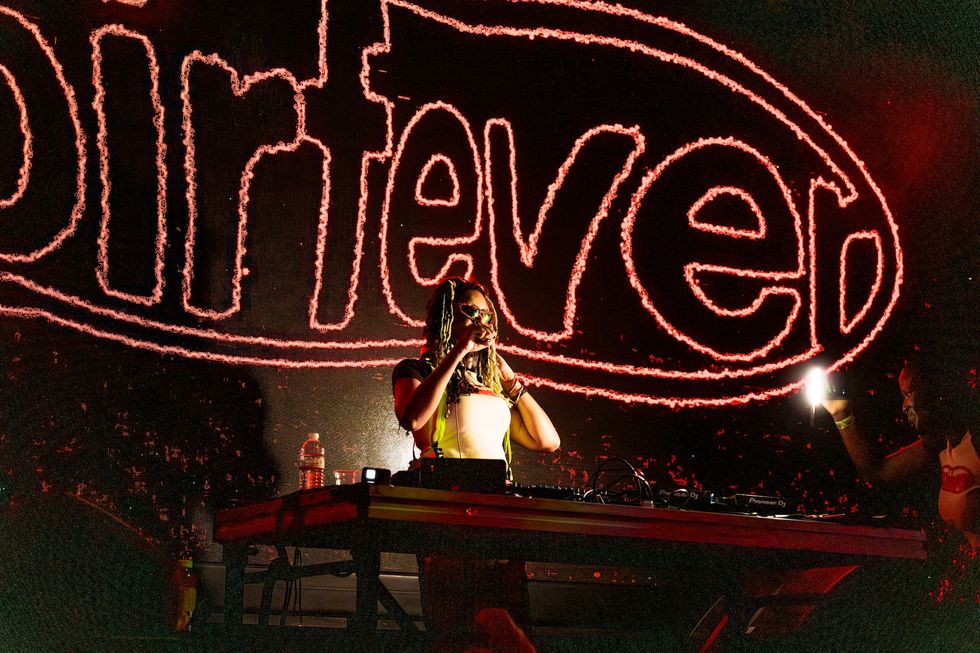
The one persistent theme that I saw them all communicate to each other, and to me, was that they were making music they never thought they could make, or they dreamed of making. Was that by design, on your end, putting them together in this way?
I was pretty much sure that’s what was going to happen. The reason being, when I started a support group for black women and nonbinary people who go to festivals after George Floyd, I remember everybody coming into it like, why are we here? What is this? What is the score even? I wanted the ability to take the walls down and be pretty honest with each other, and I saw them come alive, become supportive of each other, and become friends. I was like, is this what happens when you take these isolated people and put them together?
Right now, at least in the underground and non-mainstream party spaces, some of the most influential names in dance music — Shygirl, Honey Dijon, Kaytranada, for pop music, Tinashe — are black artists, specifically women and queer people. When you wrote that open letter a few years ago, was that the future in this space you hoped for, or do you still see it on a much longer timeline?
I gave it 20 years, because like, no black person, no black woman, had won the Dance/Electronic Album of the Year at that point. That was a pretty long time since dance music had been invented, and I calculated — maybe another 20? What I feel is that those individuals are exceptions to the rule. I still feel that they’re all isolated.
Can you explain that?
I’m still seeing tons of lineups and award ceremonies that have almost no women, let alone black women. And so you know, what I want is a movement. I want abundance. I’m not stopping one, two, three. I don’t want to be able to count them on my hands. I can still count them, you can still count them, on our hands.
I was talking to people on the EMPIRE side of things, who have big dreams about dance music and the label and what these writing camps mean. When you went into this partnership, did you feel aligned with EMPIRE on that?
I was so used to being somebody who has to explain the vision to people, especially people who have deep pockets and who I get a kind of fake agreement from, like, “We’re so aligned!” I certainly reserved a certain amount of… taking it with a pinch of salt. But when we got to the camp, that whole thing lifted for me. The way they had built something so welcoming and so nurturing that one could just tumble into. I was immediately relaxed and comfortable and ready to work, it was incredible..
The girls also told me that most had not participated in a camp setting like this, but the ones that had, this experience was diametrically opposed to past camps they’ve been in, or writing spaces. Have you had your own experiences in those spaces, and if so, how did they shape your approach to this?
Yeah, I went through a writing camp, and first they had a meeting where they gave us a list of keywords.
Like, keywords to include in the lyrics?
Yeah, motivational words like “up,” “greatness,” and “we are the best.” They gave us actual tracks to reference. Then they sent us to a studio that is for TV mixing. I was like, we cannot work here, are you crazy? This is the wrong type of studio, I can explain to you why, but everybody who makes music knows that you don’t make music in a TV recording studio. It felt like being in a hilarious Black Mirror episode, and we did actually write a fire beat, but we wrote it in the context of a complete comedy. We even gave ourselves a different name, so stupid. The way that people were picked was like, can you breathe? Are you human? Okay, cool. Great. Love it.
People around the camp have performed before, but others are just at the starting stages of their musical journeys. Have you reminisced at all about when you started?
I’m nostalgic all the time for a history that I never had. Even if I made the box, and I’m standing in front of crowds of people, I wanted to feel at home. I wanted to feel it. I wanted to look across something. I wanted to feel connected. That’s why I still moved towards this, no matter what kinds of setbacks, because I’m so glad I’ve done all this work to get here, because it’s everything that I wanted it to be. It doesn’t feel like when you win something, or when somebody tells you that your track is so fire, and people are asking for your picture. I feel like this because of sisterhood. It feels like you’re part of this new wave of creativity, and that almost all of this doesn’t matter, it feels more like you as a person matter. And then, you know, the fact that you happen to be awesome at music is a nice extra.
With Noir Fever, this camp, everything you’ve been doing around music the last few years, has it influenced the music you’ve made at all, or the way you approach making music?
Over time, I started to have a criteria: Can I feel comfortable and happy with the person that I’ve been making music with, which didn’t used to happen. When you went to a major label, you get put in the studio with all sorts of people who you’ve never even met or heard of, and you just have to go. It’s like the weirdest form of matchmaking. Now, I feel like I have other parts to my creative process. I’m lucky. My process has always been pretty consistent, and that’s a place where I was looking for things to change. It was the culture that I needed, the context.
Last question, because we’re cutting it close. If you could give advice now, in this moment, to any other Black women, nonbinary people, trans people, trying to break into electronic music, or making bedroom pop music what advice would it be?
Remember to honor yourself, where you’re the most vulnerable. I personally am a very ambitious person, and I put myself at risk in ways in my career, and I put my need to be in touch with Blackness, and my need to feel that love, and all those things on the backburner for a really long time. I just don’t want that for the next generation. I don’t want to say that’s what it takes. I want to say, create your tribe, bring it with you, and take it. Take them with you. Have your people, the right people, your champions, you deserve it. You don’t have to be isolated.
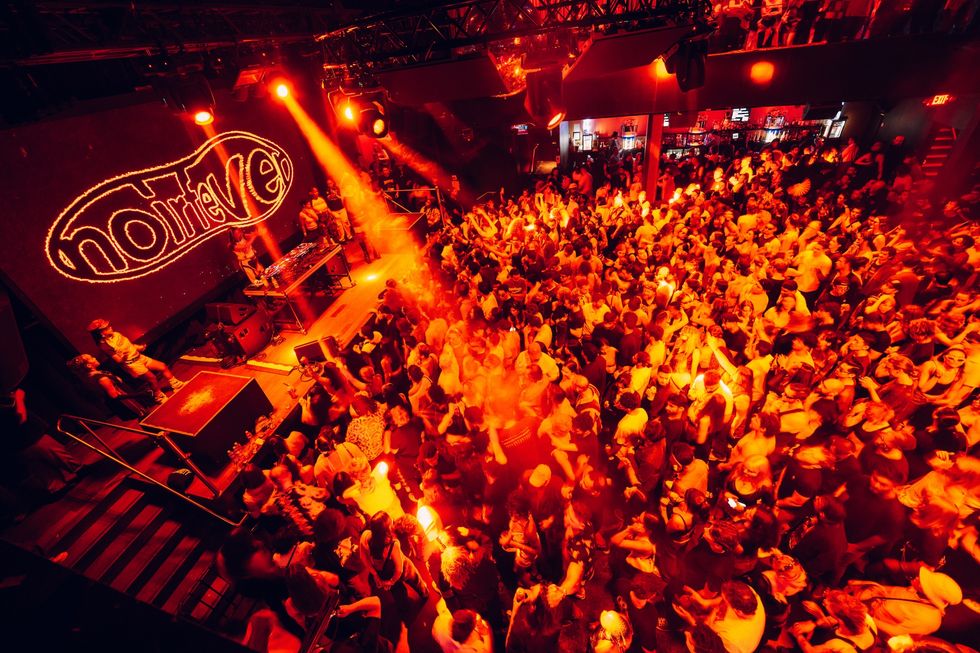
Photography: Sebastian Segura, Eric Ananmalay, Ernie Garcia
MORE ON PAPER
ATF Story
Madison Beer, Her Way
Photography by Davis Bates / Story by Alaska Riley
Photography by Davis Bates / Story by Alaska Riley
16 January
Entertainment
Cynthia Erivo in Full Bloom
Photography by David LaChapelle / Story by Joan Summers / Styling by Jason Bolden / Makeup by Joanna Simkim / Nails by Shea Osei
Photography by David LaChapelle / Story by Joan Summers / Styling by Jason Bolden / Makeup by Joanna Simkim / Nails by Shea Osei
01 December
Entertainment
Rami Malek Is Certifiably Unserious
Story by Joan Summers / Photography by Adam Powell
Story by Joan Summers / Photography by Adam Powell
14 November
Music
Janelle Monáe, HalloQueen
Story by Ivan Guzman / Photography by Pol Kurucz/ Styling by Alexandra Mandelkorn/ Hair by Nikki Nelms/ Makeup by Sasha Glasser/ Nails by Juan Alvear/ Set design by Krystall Schott
Story by Ivan Guzman / Photography by Pol Kurucz/ Styling by Alexandra Mandelkorn/ Hair by Nikki Nelms/ Makeup by Sasha Glasser/ Nails by Juan Alvear/ Set design by Krystall Schott
27 October
Music
You Don’t Move Cardi B
Story by Erica Campbell / Photography by Jora Frantzis / Styling by Kollin Carter/ Hair by Tokyo Stylez/ Makeup by Erika LaPearl/ Nails by Coca Nguyen/ Set design by Allegra Peyton
Story by Erica Campbell / Photography by Jora Frantzis / Styling by Kollin Carter/ Hair by Tokyo Stylez/ Makeup by Erika LaPearl/ Nails by Coca Nguyen/ Set design by Allegra Peyton
14 October
